Do you recognize these names: Harold F. Handing, Benson S. Alleman, Richard Baker, Alex T. Cameron, and Jacques A. Bailly. A hint, each of these men have held the same job, one after the other, since 1946.
In the far-flung parts of America – where people once lived on farms or in country villages – the residents welcomed any event at which they could gather to be entertained. Church on Sunday, whistle-stop political campaigns, harvest time and election day each fall, and carol singing in December were great activities, but the most popular of all were the ones that guaranteed attendance by the whole community. It was the annual spelling bee at the schoolhouse.
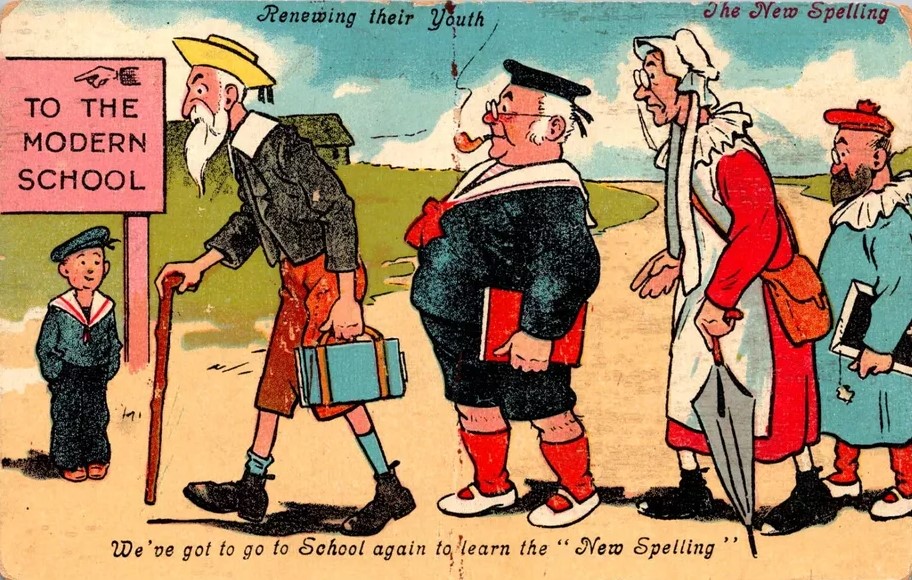
There is no known record of the first spelling bee, but for sure, it was Noah Webster’s The American Spelling Book that made the bees immensely popular. Webster published his “speller” in 1783 and eventually sold over 60 million copies. This one book created a uniform system of spelling and pronunciation that was adopted exclusively, except in parts of the South, as the educational standard for America.
In the 19th century, the standard bee started with a classroom full of children – presumably with clean hands and faces, stepping up to a line on a stage. They would wait for their turn and when it came, the student would take one step forward, listen to the pronouncer give them their “word.” If their answer matched the spelling in “Webster’s Speller” they would step back and listen for applause. If their answer was wrong, the room remained silent, and the “misspeller” would take a seat in the audience.
Then on June 17, 1925, the Louisville Courier-Journal sponsored a “scholar’s event” that became the first National Spelling Bee. It was held in Washington, D.C., and an eleven-year-old boy from Kentucky named Frank Neuhauser won by spelling gladiolus. A gladiolus is the name of a flower that Frank’s mother had in her garden. The plural of the word is gladiola – a word that is more familiar.
At that first spelling bee, the pronouncer was an English language professor, Dr. George S. Wills, from Western Maryland College in Westminster, Maryland. None of the newspapers that carried his obituary (in 1956) mentioned his service as a spelling bee pronouncer, but Dr. Wills set the standard for those who followed him. Among them are the prominent educators listed above.
Dr. Jacques Bailly is the current pronouncer. He teaches at the University of Vermont. He was America’s spelling champion of 1980.
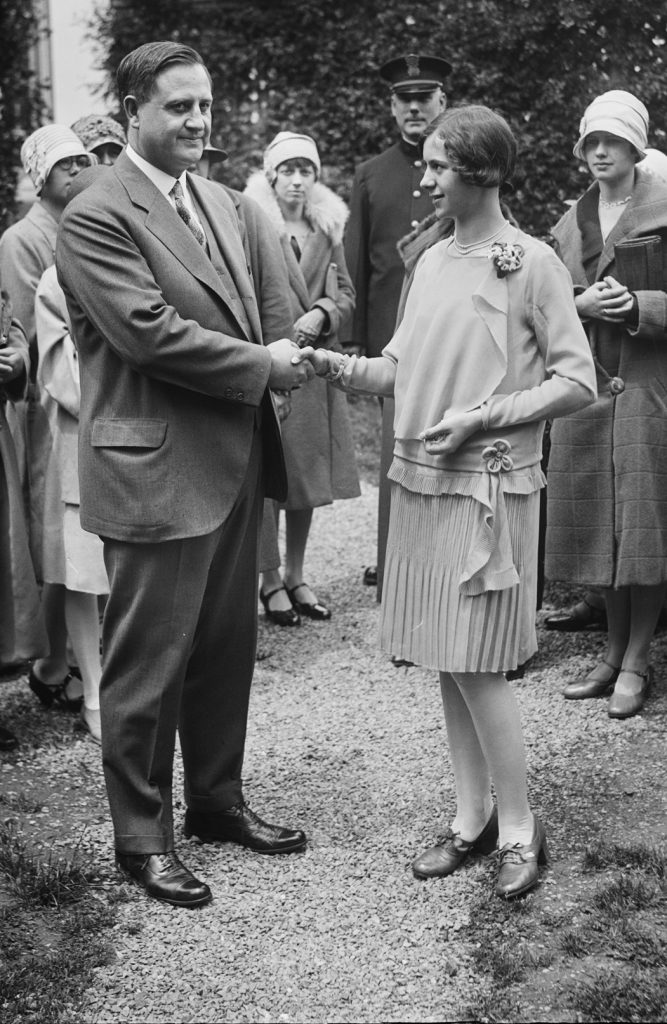
Spelling bee postcards are few but when the card here was discovered at the Old Dominion postcard show in November 2023, its story had to be told.
The girl in the picture is Betty Robinson of South Bend, Indiana. She is congratulated as winner of the 4th annual National Spelling Bee in Washington, D.C.
On Wednesday, May 23, 1928, her picture appeared on the front page (above the fold) of her hometown newspaper, The South Bend Tribune, over the headline:
LOCAL GIRL WINS
SPELLING TITLE
Betty Robinson is Victor
in National Contest:
Receives $1,000.
The article that follows details the final round of the Bee and names the second-place finisher (Pauline Gray of West Salem, Ohio) and third-place finisher (Bessie Doig of Detroit, Michigan).
Betty won the contest by spelling KNACK.
***
The Scripps Howard News Service acquired sponsorship of the event in 1941, based on the primary mission of the corporation’s founder, E. W. Scripps who was responsible for the long-ago created logo of, “give the people light and they will find their way.” Since the company’s take over of sponsorship there have been only two cancellations: first from 1942 to 1945, because of the war and in 2020 during the Covid-19 pandemic.
Since the late 1940s, there have been competitors from all the states and many English-speaking countries: Canada, the Bahamas, Australia, Singapore, New Zealand, and the European countries which mandate English as a second language.
The bees are usually held on the weekend following Memorial Day and broadcasted each year through global television networks. Viewer estimates range from six to nine million annually.
Finally, not to put a fine point on it, the prizes earned for winning the spelling bee are considerable: first there is the Scripps Cup. The cup is adorned with etchings of an open book, a honeycomb, and the word “gladiolus” – the first winning word from the 1925 competition. The cup is accompanied by a cash prize of $50,000; secondly, the Encyclopedia Britanica presents a $2,500 cash prize and a three-year membership in their 400-volume reference library; third, Scholastic donates $1,000 to the winner’s school of choice; and finally, the winner receives a commemorative medallion.
Makes you wish you had paid attention in spelling class – right? My spelling career ended when Mrs. Adams asked me to spell – remember. In the last 66 years I have never again misspelled that word.
***
Learn to Spell
Two of the best methods are visually, see the bare (uh, sorry) bear on the left; or by repetitive practice as demonstrated by Winnie the bear on the right.
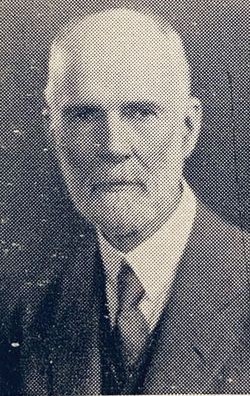
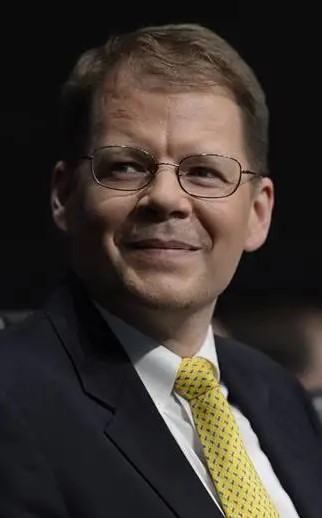
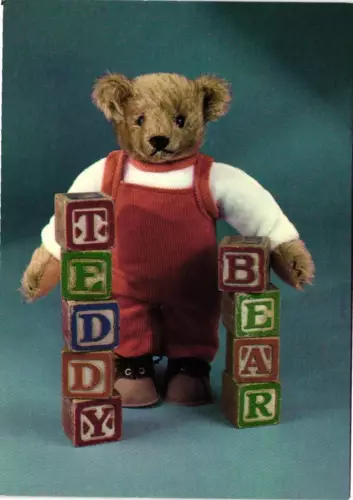
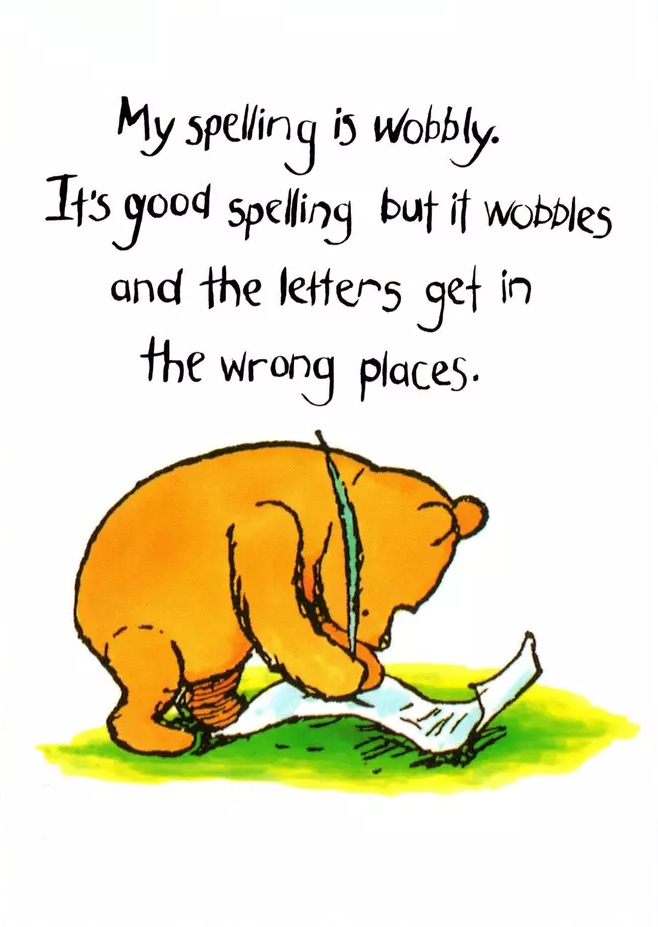
I believe that the spelling bee is the last remaining socially-accepted form of child abuse. No longer is the winner the last contestant standing who is able to spell a word like knack. Rather, the last rounds generally consist of words that no one has ever heard of–including the judges! For this, the young contestants, in preparation, must devote hours to rooting out bizarre “words” that no one has ever encountered–or ever will. Unlike knack–or even mnemonic or liaison–I’m talking about words like syllepsis, esquamulose and shalloon. Boo!
Dennis,
Thank you for this very insightful comment.
Ray
I won my school’s spelling bee when I was in fifth grade. My reward was a pen imprinted with the logo of the Cleveland Press, the local Scripps Howard paper.
Interesting!
Thanks
Very unusual subject for postcard collectors. Even though I was never involved in a spelling competition I enjoyed reading about one.